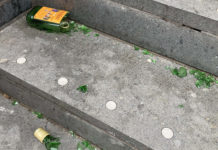The forthcoming recycling initiative will introduce a few necessary changes for operators, writes David Barnes

SCOTLAND will soon be the first part of the UK to introduce a deposit return scheme for drinks containers and it will mean changes for any business that makes, ships or sells drinks.
Consumers will be charged a 20p deposit when they buy a drink in a metal can or plastic or glass bottle, and get their money back when they return it to be recycled.
Deposit return is a way of making producers responsible for the environmental management of the materials their products come in. That is why drinks producers are being asked to lead on implementing the scheme.
Under the regulations currently being considered by the Scottish Parliament, drinks producers will appoint an industry-led scheme administrator to fulfil their obligations on their behalf.
This approach isn’t limited to producers. Organisations like the Scottish Beer & Pub Association and the Scottish Licensed Trade Association have been giving insight on the development of the scheme, giving hospitality businesses a voice.
As a major seller of bottled and canned drinks, the hospitality sector will have a key role to play in the scheme.
However, for most pubs, bars and restaurants, the bottle or can doesn’t leave their premises.
So how will it work for your business?
If you sell drinks exclusively for consumption on-site, you will be able to choose whether to charge the 20p deposit to your customers.
For the typical bar or restaurant, it might not make sense to charge the deposit and issue refunds when customers finish their drinks, as the container won’t be leaving the premises.
This means that your interaction with your customers will be unchanged.
However, there will still be key changes behind the scenes.
The deposit moves through the scheme in a loop, with each participant being reimbursed as the 20p passes through the scheme.
Wholesalers will pay the 20p when buying stock and you will pay 20p for each bottle or can you buy to fill your fridges or stack your shelves.
If you are not charging the deposit to customers, you are simply reimbursed for each empty bottle or can that you return to the scheme.
The scheme administrators will be responsible for collecting those empty containers for recycling.
This will be done free of charge so it’s a chance to make savings on waste management costs.
If you sell drinks to take away, you will act much the same as any other retailer, including offering a return point.
You will charge the 20p deposit to your customers and issue refunds when they return empty bottles or cans to be recycled. These will then be collected by the scheme administrator, and you’ll be reimbursed for the deposits you have paid out.
There will be additional costs for businesses acting as return points. To reflect this, if you are collecting returns from customers, you will receive a handling fee, designed to cover the cost of materials used for collection and storage of containers.
The level of the handling fee and the details around payment terms and collection frequency are expected to be decided upon by the scheme administrators. Applications to become a scheme administrator will open later this year, once the regulations have been approved by the Scottish Parliament.
Scotland has declared a climate emergency and it’s clear that business as usual is not an option. We cannot continue to consume and waste at the rate we do.
With deposit return, we have a ready-made solution to tackle the number of bottles and cans that are thrown away. Scotland can be proud to be leading the way in the UK and hospitality businesses will be key to its success.
David Barnes is programme manager for the deposit return scheme at Zero Waste Scotland.



















